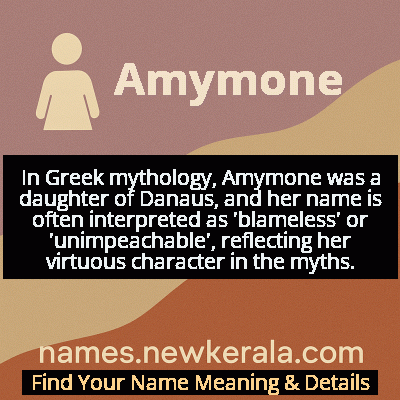Amymone Name Meaning & Details
Origin, Popularity, Numerology Analysis & Name Meaning of Amymone
Discover the origin, meaning, and cultural significance of the name AMYMONE. Delve into its historical roots and explore the lasting impact it has had on communities and traditions.
Name
Amymone
Gender
Female
Origin
Greek
Lucky Number
5
Meaning of the Name - Amymone
In Greek mythology, Amymone was a daughter of Danaus, and her name is often interpreted as 'blameless' or 'unimpeachable', reflecting her virtuous character in the myths.
Amymone - Complete Numerology Analysis
Your Numerology Number
Based on Pythagorean Numerology System
Ruling Planet
Mercury
Positive Nature
Adventurous, dynamic, curious, and social.
Negative Traits
Restless, impatient, inconsistent, prone to indulgence.
Lucky Colours
Green, white.
Lucky Days
Wednesday.
Lucky Stones
Emerald.
Harmony Numbers
1, 3, 9.
Best Suited Professions
Sales, marketing, travel, entertainment.
What People Like About You
Versatility, charisma, adventurous spirit.
Famous People Named Amymone
Amymone of Argos
Mythological Figure
Central figure in the Danaid myth cycle; associated with the founding of Lerna's springs
Amymone (Literary Figure)
Mythological Character
Featured in multiple lost Greek tragedies and epic poems
Amymone in Art
Artistic Subject
Inspiration for classical and Renaissance artworks depicting mythological scenes
Name Variations & International Equivalents
Click on blue names to explore their detailed meanings. Gray names with will be available soon.
Cultural & Historical Significance
The cultural importance of Amymone extends beyond the murder narrative to her association with water sources and fertility. Her encounter with Poseidon, who saved her from a satyr and created the Amymone Spring through his trident, connects her to fundamental elements of life and sustenance. This transformation from potential victim to mother of a hero (Nauplius) and discoverer of vital water sources demonstrates the Greek mythological tendency to balance dark deeds with redemptive qualities. Her story was celebrated in lost plays by Aeschylus and other tragedians, indicating her significance in Athenian dramatic traditions and religious consciousness.
Extended Personality Analysis
The name Amymone evokes a personality marked by profound complexity and emotional depth. Individuals associated with this name typically demonstrate remarkable resilience and adaptability, capable of navigating challenging circumstances with both grace and determination. They often possess a strong sense of duty and familial loyalty, though this can sometimes lead to moral conflicts when obligations clash with personal ethics. Their character combines traditional feminine strengths with unexpected fierceness, creating a compelling blend of vulnerability and power.
These personalities tend to be highly intuitive and perceptive, with an ability to read situations and people with unusual accuracy. They often serve as peacemakers or mediators in conflicts, drawing on their understanding of multiple perspectives. However, when pushed to extremes, they can display surprising ruthlessness and decisive action. The Amymone personality embodies the ancient Greek understanding of human complexity - that individuals contain the capacity for both creation and destruction, compassion and violence, often simultaneously. Their life journey typically involves reconciling these opposing forces within themselves.
Modern Usage & Popularity
In contemporary times, Amymone remains an extraordinarily rare given name, primarily confined to academic discussions of mythology and occasional use by classical scholars naming their children. The name has never gained significant popularity due to its complex mythological associations and challenging pronunciation for non-Greek speakers. However, it has seen minor resurgence among parents seeking unique mythological names with strong historical roots. Modern usage is almost exclusively limited to Greece and diaspora communities, with occasional appearances in literary works or artistic contexts. The name's association with marital violence continues to deter widespread adoption, though some feminist reinterpretations have attempted to reclaim Amymone as a symbol of female agency against forced marriage. Current naming trends show minimal usage, with the name appearing more frequently in scholarly publications than birth certificates.
Symbolic & Spiritual Meanings
Amymone carries rich symbolic meanings that transcend her mythological narrative. She represents the essential duality of human nature - the capacity for both profound violence and redemptive creation. The name symbolizes the Greek philosophical concept that individuals are rarely entirely good or evil, but rather complex beings whose actions must be understood within their specific contexts. Her association with water sources makes her a symbol of life-giving forces and hidden depths, representing both the surface tranquility and dangerous undercurrents of human psychology.
Metaphorically, Amymone embodies the transformation of trauma into strength and the alchemical process of turning violent acts into life-sustaining resources. Her story symbolizes how personal suffering can lead to communal benefit, as her individual ordeal resulted in the creation of vital water sources for her community. The name also represents the tension between fate and free will, serving as a reminder that even within predetermined circumstances, individuals maintain agency and the power to shape their legacies through subsequent choices and actions.

